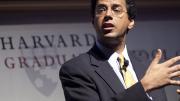In the professional world, what separates greatness from mere competence? Why is a cystic fibrosis treatment center in Minnesota miles ahead of a similar program in Cincinnati? Why are certain teachers getting first-rate results in the classroom when others are merely getting by?
Atul Gawande, a Harvard Medical School professor, surgeon at Brigham and Women’s Hospital, and New Yorker staff writer who has traveled the country researching answers to this question, says the answer has little to do with income level, education, or high intelligence. The key to being great at any given profession, he says, is the ability to recognize failure.
“What I found over time, trying to follow and emulate people that were focused on achieving something more than competence, is that they weren’t smarter than anybody else, they weren’t geniuses,” Gawande told an audience at the Harvard Graduate School of Education’s Askwith Forum on Wednesday.
“Instead they seemed to be people that could come to grips with their inherent fallibility—fallibility in the systems that they work in, and with what it took to overcome that fallibility.”
Telling stories that ranged from his research on why certain medical centers produce better results than others, to why John Wooden (the UCLA basketball coach whose team won the NCAA championship 10 out of 11 years straight) is such an excellent coach, or why a certain eighth-grade math teacher gets stellar results, Gawande emphasized that paying attention to small details as well as having clear goals produces excellent results in almost all professions.
For Wooden, it was showing his freshman squad every year how to properly put on their socks: “He takes off the shoes, and takes off the socks, and explains you have to roll it up around the toes and ball of the foot and around and up the leg and smooth it out the whole way…he showed them and then made them do it, and then did it again,” Gawande said. “And he has reasons for this—number one, he said, blisters end seasons—it not only ends their season, but it ruins the likelihood they are going to win. The second thing he wanted them to understand is that details create success.”
There is a distance between competence and excellence in very hard tasks, but not in very simple ones, Gawande pointed out. “If your job is to count a deck of three cards, then there won’t be a big gap between being competent and great,” he said. “But if your job is to teach seventh-graders, help someone stay healthy, or start a business, there is a big difference.” (Gawande’s book Better, published in 2009, explores themes on closing the gap between being average and being the best.)
Gawande therefore asked how a society can encourage and replicate what those at the forward edge of the bell curve are achieving. The secret, he said, is coaching. Although athletes have coaches all their lives and are constantly working to improve their skills, many professionals do not. Teachers in particular, he noted, can benefit from having coaches sit in on their classroom lessons and offer constructive criticism afterwards. As a surgeon, Gawande said, he invites a retired mentor professor to watch him perform surgeries once a month and offer critiques, correcting aspects of his work that he would not catch himself.
“We have a wide bell curve of performance, and we have a wide bell curve for costs, and there is no relationship between the costs and the results—many of the most expensive places are getting perfectly mediocre results,” he stated. “Under conditions of complexity we are still training and rewarding and hiring people to be alphas, when it is pit crews that we need. When you end up coaching, the values that you end up expressing are…humility, discipline, and the willingness to engage in teamwork. Our north star is what you see when it all goes right.”









